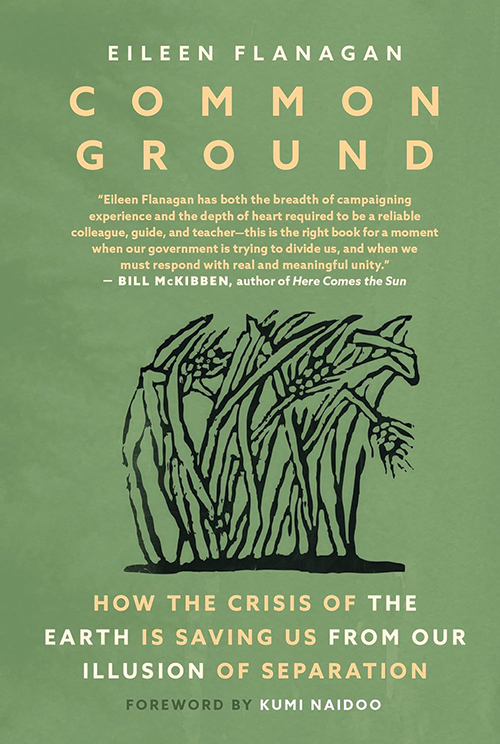
Common Ground: How the Crisis of the Earth Is Saving Us from Our Illusion of Separation
Reviewed by Ruah Swennerfelt
September 1, 2025
By Eileen Flanagan. Seven Stories Press, 2025. 320 pages. $21.95/paperback; $14.99/eBook.
While addressing our planet’s manifold crises, Quaker activist and writer Eileen Flanagan offers an account of her experience in the climate justice movement, as well as many stories she’s learned through her personal relationships with other community leaders who are bringing about change. In Common Ground, Flanagan’s fourth book, “our illusion of separation” is examined in light of decades of activist work for earthcare, peace, and social justice, including her work as a trainer and as a listener.
She explains in the introduction how she first experienced the message about the illusion of separation: as an insight “coming from Spirit . . . the words came from a source of wisdom beyond my own mind.” After many years of committing to small changes, such as hanging laundry to dry and cutting down on meat consumption—efforts she calls “spiritual practices meant to strengthen my mindfulness and integrity”—Flanagan shifted her perspective on what’s possible. Now her “change work” focuses on challenging corporations, which, as she points out, “have so much more power than individuals.”
Common Ground is divided into four parts, and readers first learn how the illusion of separation has blocked meaningful change: how divide and conquer—pitting one group against another—has been a fundamental corporate strategy. One example of the illusion of separation is the thought that an industry’s pollution harms only those who live close by, often those without many resources. Air travels everywhere, however, and personal wealth doesn’t create a shield against that kind of pollution.
Flanagan then takes us to New Orleans, La., specifically Cancer Alley, the infamous 85-mile stretch of land along the Mississippi River between New Orleans and Baton Rouge where a disproportionate number of poor, Black citizens live, and where over decades racist policies have unfairly and unequally affected the victims of hurricanes and industrial accidents. Flanagan has talked with and listened to people who suffered, as well as those who stepped up as activists to encourage change. Margie Richard is one such activist: “a church-going teacher and mother motivated by a simple desire to protect the people she loved.” Richard led a successful campaign against the large and powerful Shell oil company. Together with her fellow concerned neighbors, she pushed Shell to buy out at market value the houses of those who were at risk from explosions and fires caused by the nearby refinery. There are plenty of stories like this, yet during her visit there in 2018, Flanagan was told by White Louisianans that “there was no such thing as environmental racism.”
Racist policy is a prevalent theme also in Flanagan’s account of her experience with Indigenous people in Minnesota. She joined with the resistance effort to stop the installation of the Line 3 pipeline that would have transported the tar sands oil from Canada through the United States, threatening water quality for the Indigenous tribes. She also traveled to the Navajo Nation in the Southwest and learned of their struggles to maintain their own land and to have control over their renewable energy production. I was distressed to learn of the harm and injustice that have occurred at the hands of the government and of corporations.
Flanagan shares what she has learned about being a White woman working alongside People of Color, gaining trust and sowing solidarity; these are lessons for White Friends to pay attention to. She believes that “we all have a stake in addressing the climate crisis, but many of us don’t yet feel the true cost personally. To secure a stable climate for everyone, and help each other cope with the effects already put in motion,” she writes, “we need to cultivate empathy for those already suffering.”
The words and stories of many activists appear in the book, and as most are not well-known outside their regions, we benefit from Flanagan’s work to gather and present them. She ends the book with her experience with Earth Quaker Action Team (EQAT), sharing the group’s successes and the lessons learned in their campaigns against mountaintop removal coal mining, investments in fossil fuels, and more.
Common Ground reads like a climate activist travel journal: a collection of “lessons in resistance and solidarity” that Flanagan has picked up along the way in her life-changing journey to protect the earth. Again and again, amidst all the injustice and fear, Flanagan seeks out and finds the people who are trying to find common ground, not only to admire and lift up their work but also because they give her hope. She’s convinced that working together “will actually spur us to heal our divisions, repair harms, and find a more just way forward.” For those looking to follow suit in their own change work, this book is invaluable.
Ruah Swennerfelt is a member of Middlebury (Vt.) Meeting and is clerk of the New England Yearly Meeting Earthcare Ministry Committee. She also serves on the Third Act Faith Coordinating Committee and is co-coordinator of Sustainable Charlotte Vermont. She and her husband are homesteaders on lands that once were home to the Abenakis.



Comments on Friendsjournal.org may be used in the Forum of the print magazine and may be edited for length and clarity.